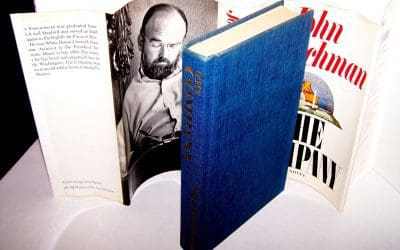– Edwin Starr
This piece for Veterans Day is excerpted from Jim McGarrah’s memoir (see below), which reminds us of the extreme and life-threatening experiences regularly faced by our men in arms.
Meditations on the Jungle Ambush
There were nights in Vietnam, long strands of time tied together with a thin wire of fear when you could almost hear the full moon keening as it rose to wait for death. These periods of semi-darkness were called midnight ambushes. The thick humid air outside carried the dark inside with every breath you took. It replaced the brightness in your soul that had leaked out the very first time you squeezed the trigger on your M-16 in your very first firefight. Sometimes people in your field of fire died. Sometimes you knew it, especially when the moon was high. It reflected the loneliness of war by casting a dim shroud of fluorescent light over dead bodies. Other nights, when no one came your way, its sugared glow tempted you to forget that each one of these ambushes held the prospect of your own oblivion by sniper’s bullet, trip wire, or bouncing betty.
Therein lay the ambivalence that made you crazy. Beauty began with absence and so did death. Without the click of a rifle bolt sliding home, the mechanical thump of helicopter rotors, the squawk of a PRC-25 radio, the rain of shrapnel through the banyan leaves, the smell of cordite, and the taste of blood, you could almost believe the oblique and ductile brightness was a romantic and buoyant fire instead of the cold reflection of horror through the lifeless clouds.
This, more than anything else, described the experience of Vietnam and the evolution of bitterness in your heart. The jungle sucked you into an unearthly calm but never without the knowledge of the coming storm that, when you least expected it, would explode in soul-shredding blood lust and at the same time, terror. This constant pressure on the edge of expectation split your psyche so much that if you came back from enough patrols, you reached a state of numbness. You became a man who wore the shroud of victim one minute and of villain the next without the clarity of mind to accept either as your lot in life. If you lived through a tour of duty and came home, this anesthetized state of nonbeing came with you. There was nothing you cared about any longer because there was no you left to care.
The numbness came at different times and in different ways for everybody and it presented itself with bizarre delusions. For me, I became indifferent to life about four months into my tour as if it were a state of wholeness reserved for the blessed and out of my reach. I became indifferent to death at the same time as if it were a state of emptiness reserved for the weak, not something that could touch me utterly and finally at any point. Some called this vacant spot in the gaze of a combat weary survivor the thousand yard stare. It was a sign that the mind had begun to ooze a protective film of disinterest over anything that resembled a “feeling.” I owe an encounter with a single spent bullet for that false epiphany.
I don’t remember the spot exactly, just that it was somewhere southwest of our normal patrol pattern. We drifted into that darkest time when night is ending and dawn has yet to arrive without so much as crossing paths with humans, ducks, water buffalos, vipers, monkey, toucans, or even a stray dog that had managed to escape the stew pot. The silence was nerve-wracking.
Across an interlocking series of rice paddies and several clicks from our current position on the perimeter of the village where my Combined Action Platoon lived and worked, the army had set up a huge base camp for an artillery unit that could pound off fire missions for miles in any given direction. The small units of Viet Cong that plagued villages like ours stealing resources from and terrifying the locals refrained from hitting the army base during the day and with little more than an occasional sapper team exploring the concertina wire that ringed the place at night. This made sense given the size of the camp and the fire power at their disposal. The problem was never the enemy for us during these brief and tiny encounters, but rather with the abundance of supplies given they army. As marines, we were used to working with what little we had in any given situation. On the other hand, these guys responded like it was the Fourth of July at every opportunity knowing they would never run low on ammo.
I walked point and the air was so wet I seemed to be swimming through it. I had unbuttoned my flak jacket hoping I could cool my sweat-drenched upper body. An open flak jacket happened to be against regulations, but I figured heat stroke probably broke some ridiculous regulation as well. Flak jackets didn’t stop 7.62 mm. rounds fired at close range from an AK-47, and that’s what happened at night anyway. They barely stopped slow-moving shrapnel. For an instant my bare chest began to dry and then started to sweat again. But, for that singular speck of time, I shuddered a wave of relief, not only from the heat, from all of it. The boredom, fear, exhaustion, confusion, anticipation, hunger, rage, pain, and sorrow, the constant baggage that I hauled around everywhere I went in Vietnam—poof!—a fog burned away by the heat of clarity, of taking a simple breath beneath a stunning ceiling of indigo speckled with stars.
“Hey Mac.” A whisper worked its way up from the middle of the squad as we snaked around a hedge row. “Marty says button your fucking jacket.”
Then, it was gone, all the beauty destroyed by the low static of a human voice. The ugliness of reality returned. Boy, did it return. All hell broke loose on the perimeter wire of the army base. M-60 machine guns rattled in the distance like hot rain on a tin roof. M-79 grenade launchers slapped the air followed by the thump of mortars. Huey Gunships rose vertically from the helipads and began a torrent of tracer fire from their electric mini-guns. The sky burned with flares. The paddies in front of us and the base camp beyond glowed in the eerie light. It was all visible, like the fireworks display at the Gibson County Fairgrounds where my father took me every year. And, it was all outgoing. No sign of enemy troops appeared near the camp. Maybe an animal had stumbled into the wire, or maybe a single sniper had fired off a round at someone stepping from the light into the shadows. As always, the response was devastating to the dirt and a few trees.


I could hear the chuckles from the rest of my squad. As we stood to return to the outpost after an uneventful night patrol, the grey light of dawn drove the darkness downward into the earth. “You think that outfit has ever actually ever killed any gooks?” Marty spoke loud enough for me to hear as we moved along the edge of the tree line. A sharp pain shot across my breast just above my heart, a sting from some venomous creature of the night. I had never buttoned my flak jacket. Slapping the spot instantly, I felt something hard, something not alive, in my right hand. It was lead. A spent bullet found its way across time and space. The army had shot me.
Obviously, the bullet had lost its momentum and tumbled in impotence from heaven. I have no idea who fired it. It appeared to be the projectile from an M-16. It did no physical damage beyond a small red welt that disappeared in a few hours. Yet, the wound has stayed with me for fifty years deep in my mind beneath the scar tissue of war. On quiet nights, when the dead visit, I greet them with respect and we talk. They speak of the loneliness of their fate and I speak in awe of mine.


No direction home
I was lucky. I came to believe the war had been a criminal act by my government almost immediately on my return. That belief allowed me to return to the role I felt most comfortable in as a misdemeanor outlaw. Rebelling against the Establishment gave me the opportunity to perform a sort of penance and relieve some of my guilt. Oh, I had problems for many years but not nearly as severe as friends my age who tried their best to justify the war and integrate back into society as our fathers had done in World War II. It took decades for some of them to understand the true cost of these foreign policy adventures urged on by corrupt politicians and controlled by corporate interest. Many Americans ignore this cost still because we have an all-volunteer army to pay it for them. It’s similar to the old Catholic practice of buying indulgences, except it’s currency is blood and sanity.
The true cost of war is measured by intimate knowledge of blood and fire, lifting seared flesh and unattached limbs from the broken rubble of homes and schools, digging graves for mothers and babies still warm in the womb. However, the true crime of war is quantified not by death or money only but through the misery of its living participants after the fact—the emotional turmoil, the survivor’s guilt, the grief, the nightmares, the pathological dysfunction of homeless Veterans, the missing arms and legs, and the vacant souls. The families of Veterans often end up broken as well, expecting their returned hero to be the same man or woman who left them for war.
I’m a story teller by trade and by spirit. Let me tell you a story. I have a very close friend, a good man, a family man, an intelligent man who paid a dear cost for his service to his country. As a matter of fact, he is paying still. My friend played football at our high school and played it very well. I believe he might have gone on to some serious university team if he had been blessed with no conscience. But, we were all from Southern Indiana, a place where God was good in 1968 and commies were the spawn of Satan. They hid under every rock. They lurked in every shadow.
“Good guys never died, they just rode off into the sunset . .”
Like many of us, my friend watched a lot of John Wayne movies and from them developed a celluloid sense of duty. By that, I mean he built an emotional construct based on Hollywood rather than reality. Good guys wear white hats. Good guys—meaning patriotic, conservative, Nixonian Republican, white Christians—always won. Good guys never died, they just rode off into the sunset with a beautiful submissive woman draped across the saddle.
Believing what he had been taught from infancy forward, my friend fulfilled his responsibility and enlisted in the Army. He became an outstanding helicopter pilot in Vietnam, a treetop flyer, skimming over the jungle and bravely out maneuvering the .50 caliber machine guns of the Viet Cong. He had one job, carrying young boys into battle and ferrying their torn, lifeless bodies from the battlefield back to some rear area morgue. Oh sorry, two jobs. Then, he had to flush the blood out of his helicopter with a water hose. Week after week, month after month, his life evolved into days of loading and unloading dead boys and nights of drinking whiskey to forget the days. He never got wounded. He never killed anybody. He simply stacked up men who were already dead like he threw hay bales into the barn loft on those Indiana summer days between semesters of high school.
Coming home, he did what many others did and carried on the illusion of normalcy. He went back to college, got a job, got married, and started a beautiful family. Most of that went on during the day. His nights were given over to the dead and to the one thing that buried the dead for him in Vietnam, alcohol. Years went by; bottle after bottle was drained dry and still the dead refused to stay buried. Post Traumatic Stress Disorder didn’t exist anywhere in the 1970’s except in the minds of Vietnam Veterans. The government refused to acknowledge it and the VA doctors blamed the nightmares, the rage, the substance abuse and fear of intimacy, the inability to focus, the clinical depression and flashbacks on other non-military causes. It was cheaper that way. My friend didn’t have a problem with his memories of war, not really. He simply couldn’t handle the stresses of his job and his marriage. Stuff happens, right?
Eventually, he drank enough vodka and scotch that leaving for work in the morning was no guarantee for his family that he would return home in the evening. Sometimes, he stopped for a quick cocktail and woke up in a different town three or four days later with no knowledge of where he was or how he got there. Then his liver began to fail. This probably saved his life. By the time he ended up in the VA hospital, various government bureaucrats and medical people had begun to admit that maybe, just maybe, war might create residual problems for those who lived through it. Maybe the mind wasn’t meant to look at what extreme and random violence forced it to see.
I was lucky, as I mentioned earlier. I went back to school but joined anti-war organizations. I became a social activist and then a drug-addled dropout. Something in my brain finally clicked and I took flight in my mind. After years of struggle, I received a BA degree and in two more years I completed two graduate programs and began writing books and teaching.
My friend, not so much. He was, he is, smarter than me and in many ways a better person than me. But, his PTSD will not allow him to finish anything he starts. I don’t know why. No one can answer that, no doctors or preachers or even my friend. He went back to college in mid-life, as I did. He sat in a classroom and made A’s till the last couple of weeks of the semester and then withdrew from every class. It wasn’t a matter of work interfering because he isn’t able to work a steady job anymore.
He kept too busy thinking about questions that have no answers. How did he live through war when so many men didn’t? Why does he deserve happiness and success? What makes him any better than all those bodies he still carries in his mind? This is called survivor’s guilt and it’s part of the cost combat veterans who continue to live must continue to pay. It’s the result of criminal behavior by cowardly politicians.
I haven’t seen my buddy in over five years, but the last time I saw him I was in his town signing copies of a new book. I met him at a bar. Yes, he was drinking again after ten years of sobriety, but he assured me only an occasional cocktail before dinner and maybe just one or two after. Everything was under control. The kids had survived adolescence and gone to various colleges to form lives of their own. Now that he could rattle around an empty house, putter in the garden, and read books without interruption, he felt well enough in his mind to handle drinking again. This is what he said, but both of us knew the truth. In the absence of the daily chaos involved with raising children and simply living, the dead were beginning to seep back into his consciousness, resurrected by loneliness.
Don’t get me wrong. This seems like a very sad story, but it has good elements along the way. It’s a simple analogy on behalf of a new generation of young Americans who have been fighting longer than any military in our history.
Sent into battle by a new generation of politicians most of whom evaded the Vietnam War, these young men and women serve multiple deployments in fierce, mind-altering, situations. If they live to return home, they face demons that only other combat veterans can truly understand—the highest suicide rate in military history, an unemployment rate double the national average, overcrowded psychiatric services and unsure treatment methods for PTSD, families that now see them as dangerous strangers, a public almost completely indifferent to their struggles, and a political system unafraid to use them for personal and corporate agendas. This is what real crime looks like, and it is not a misdemeanor.






0 Comments